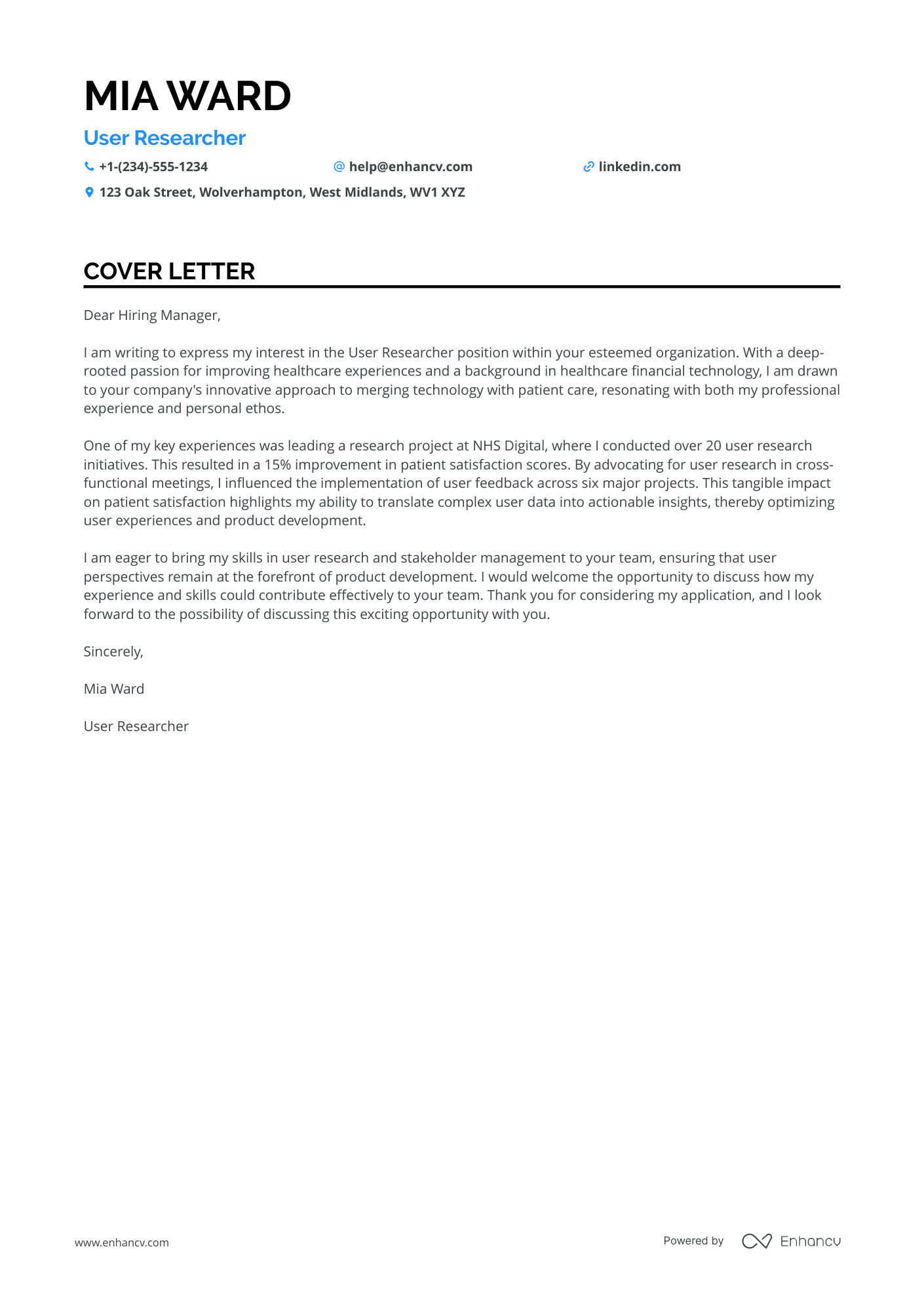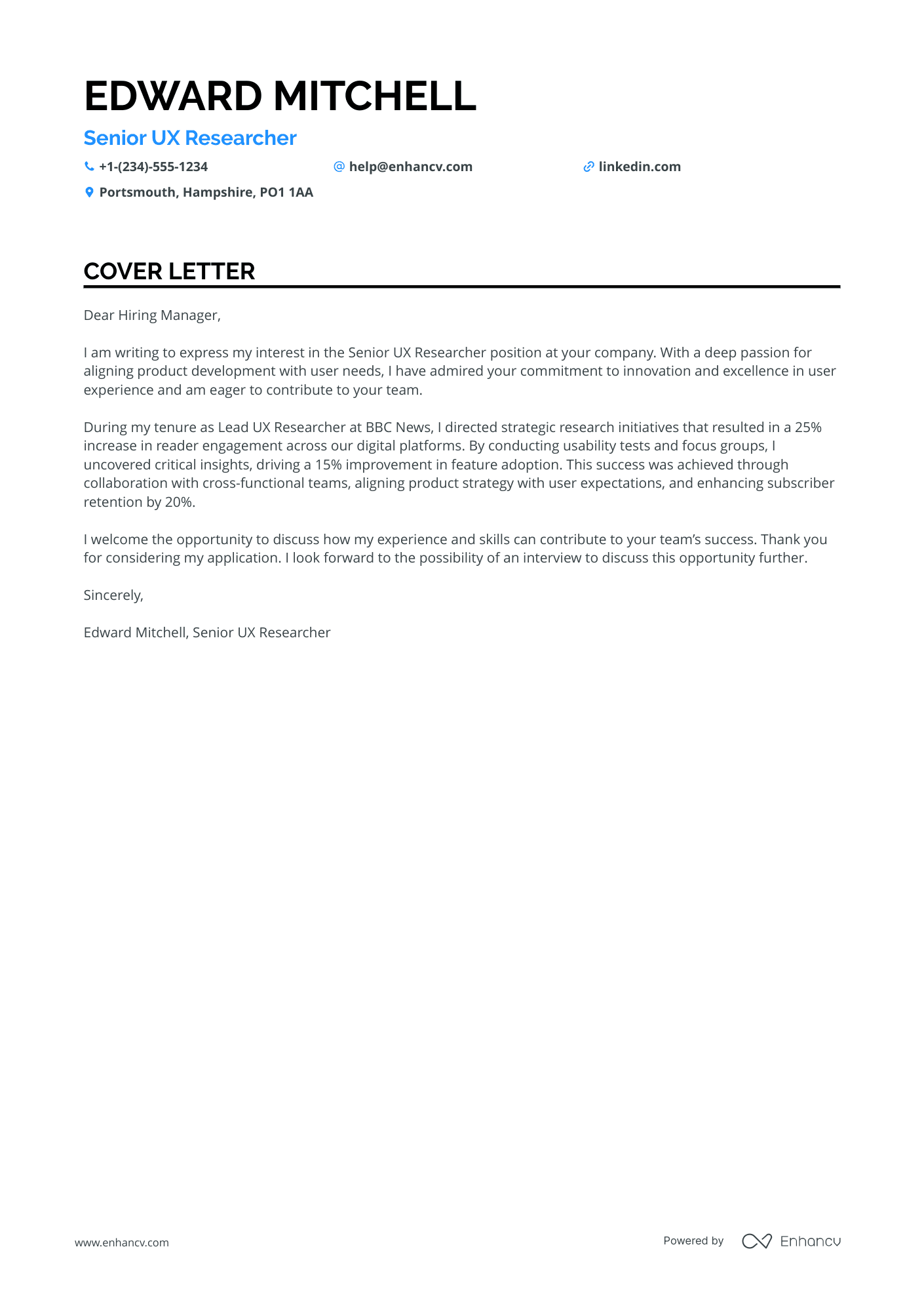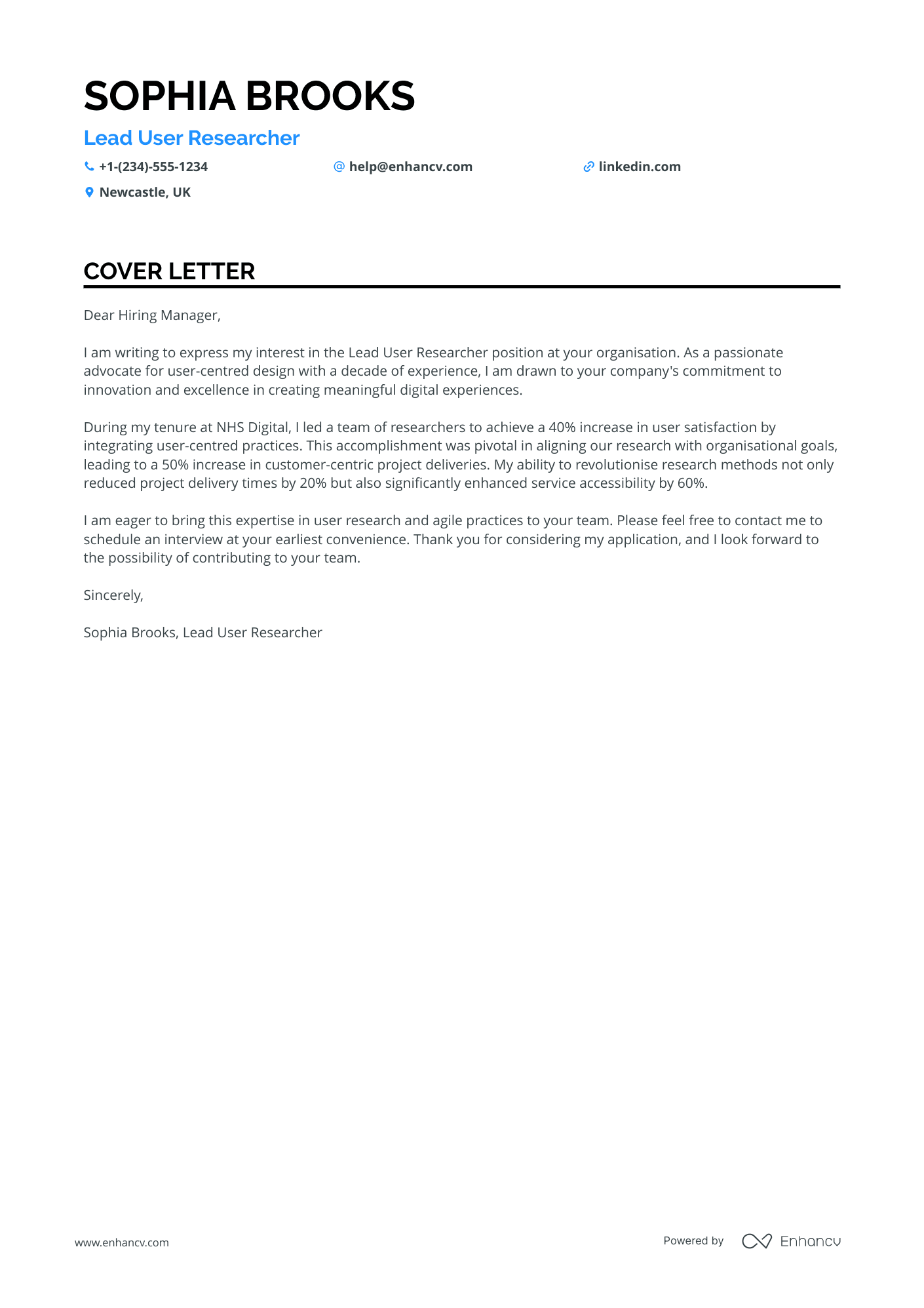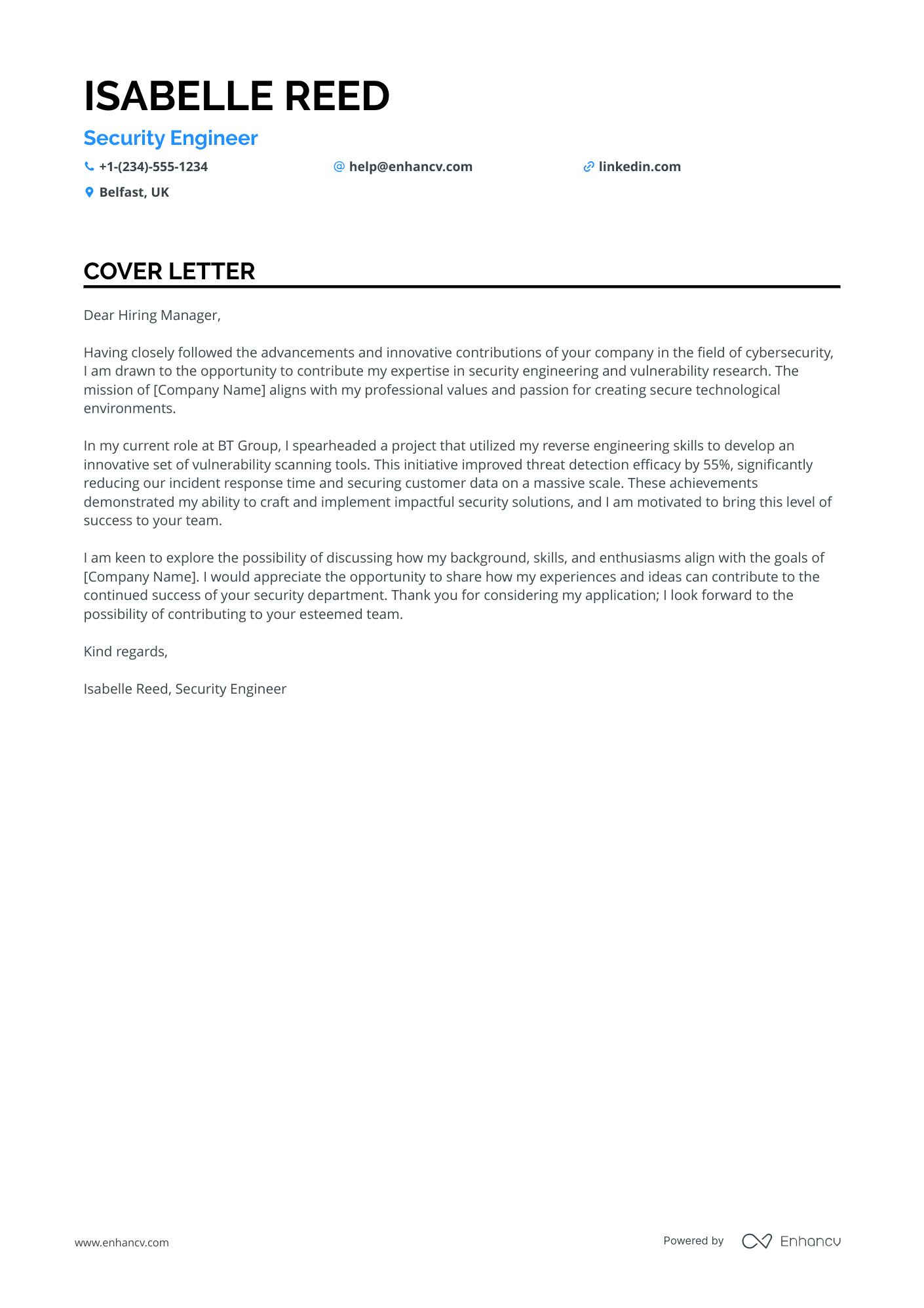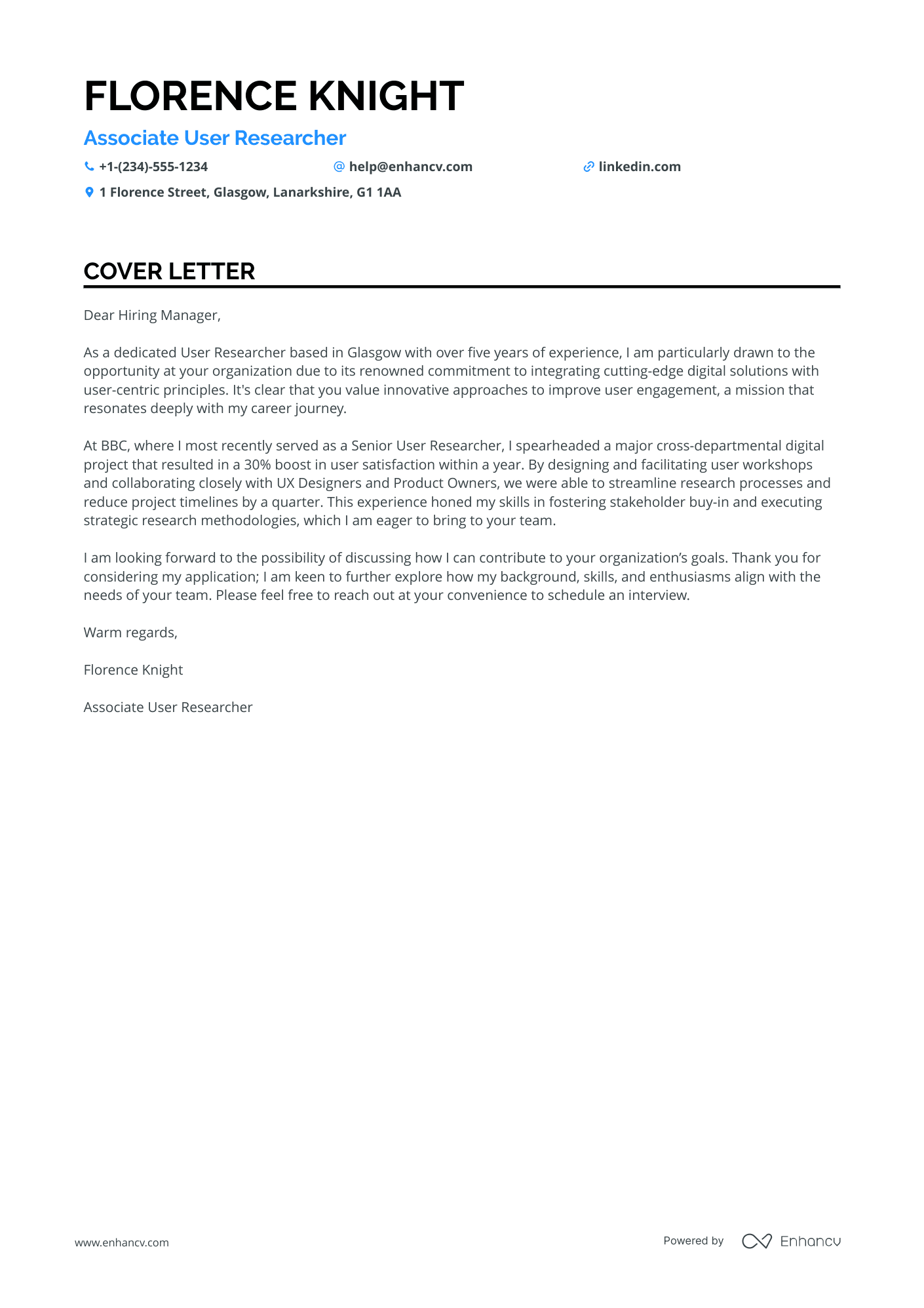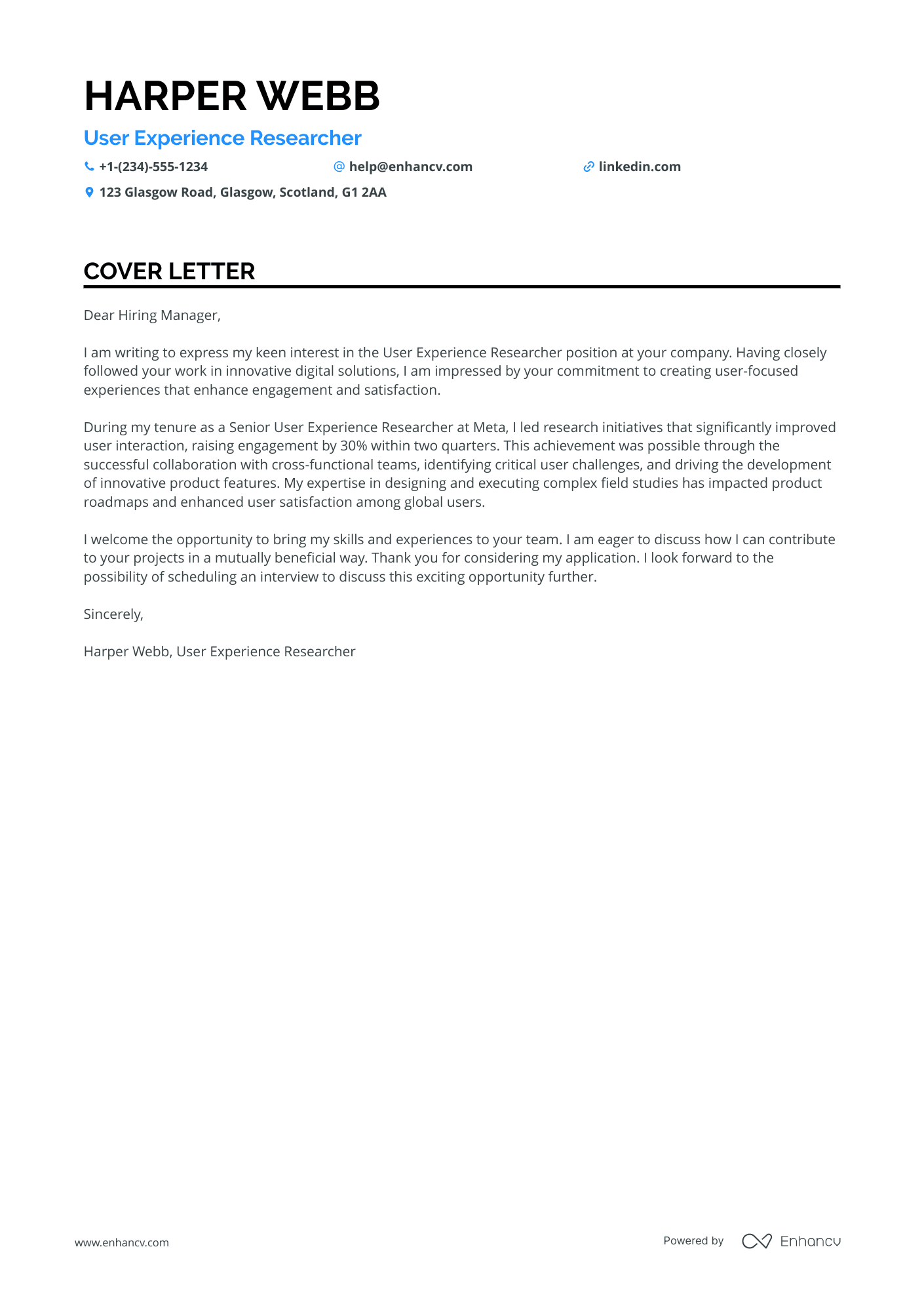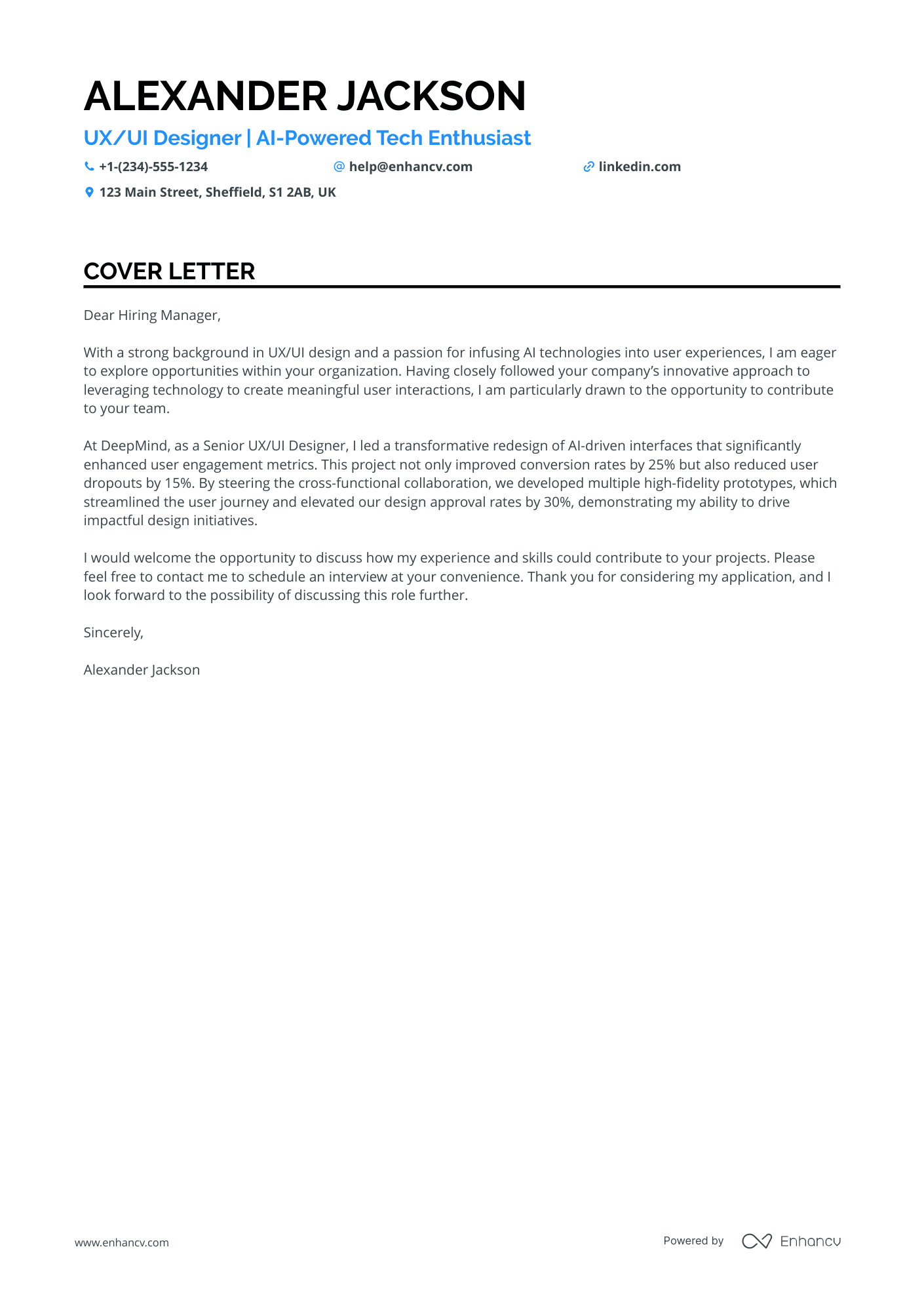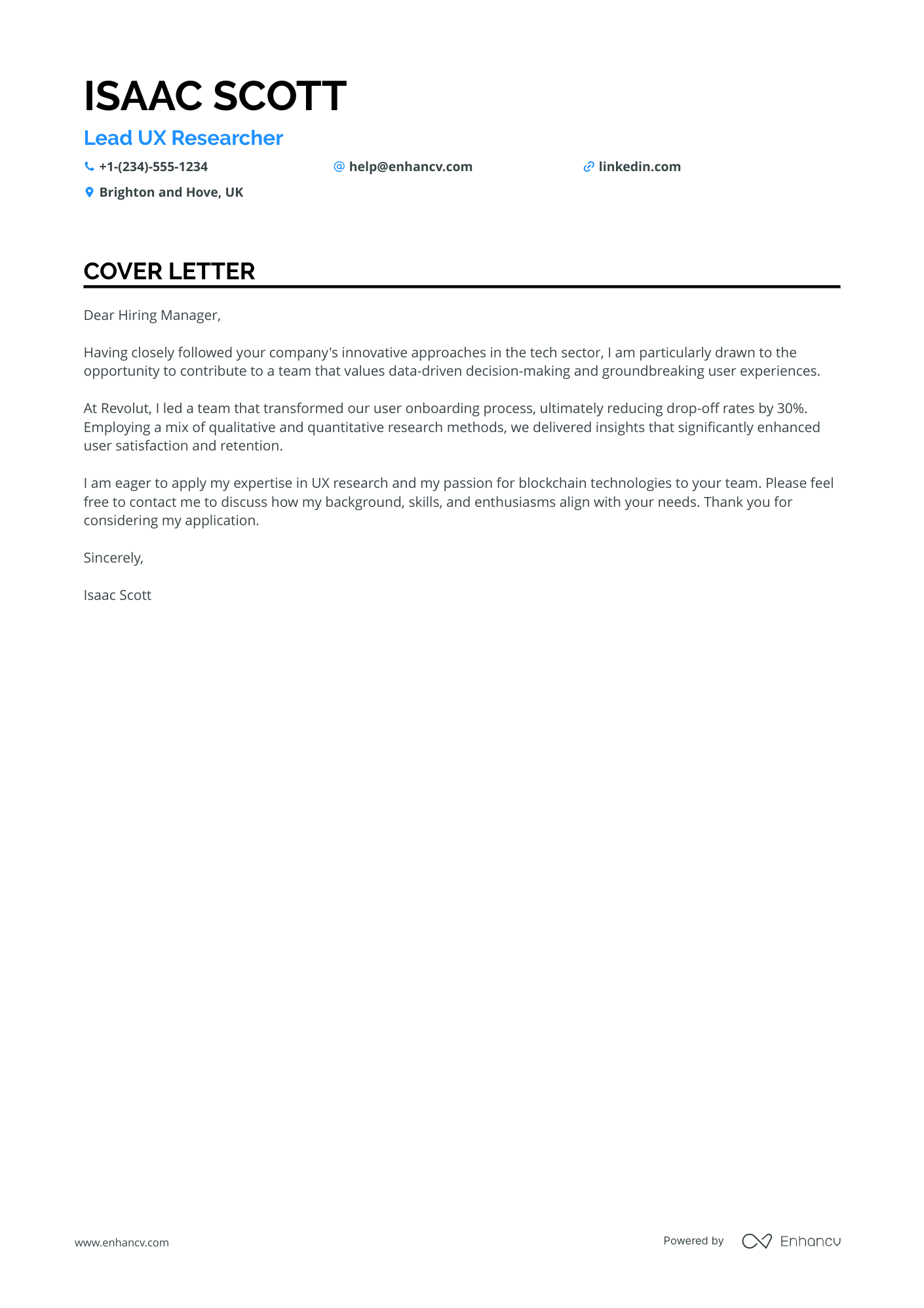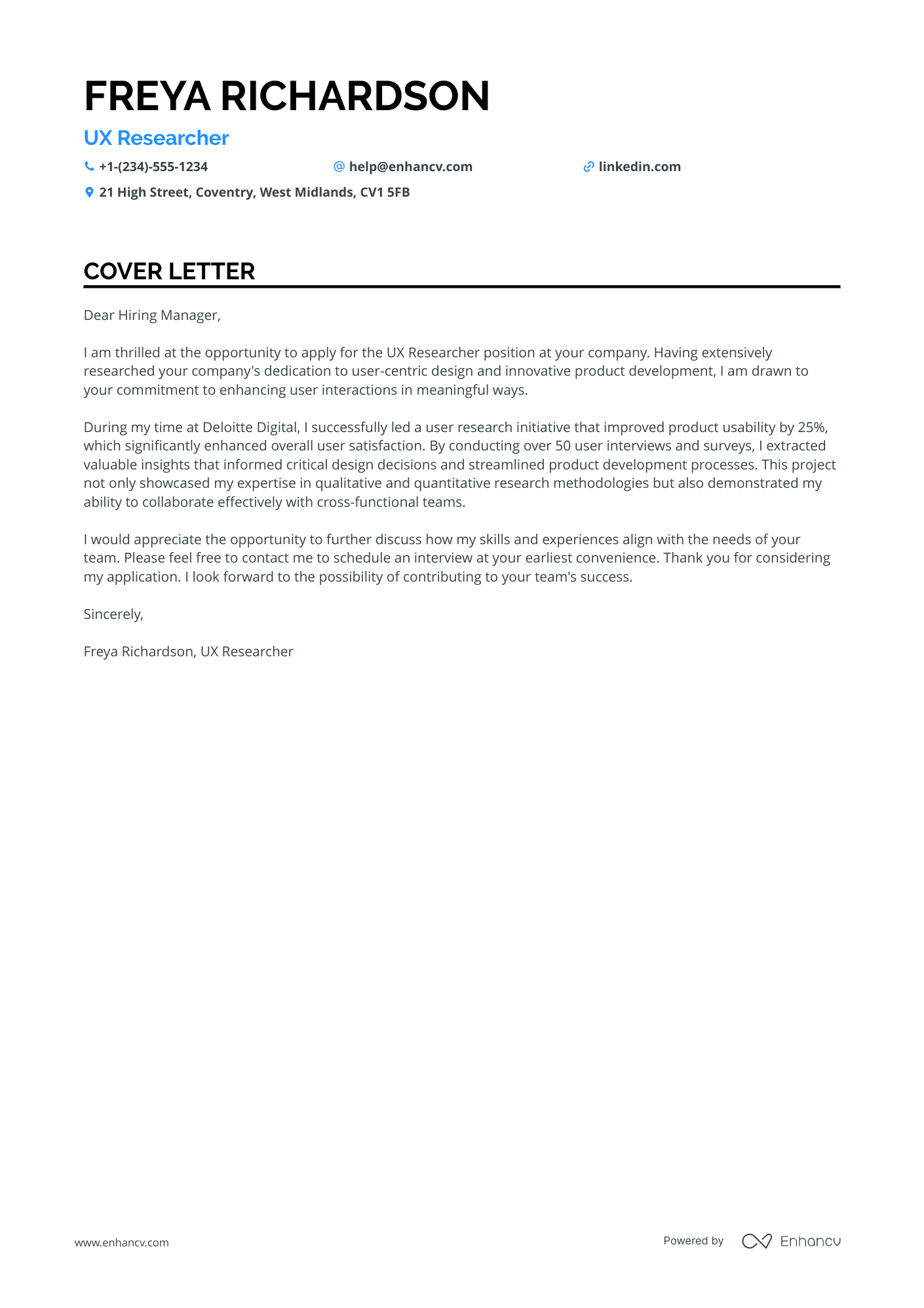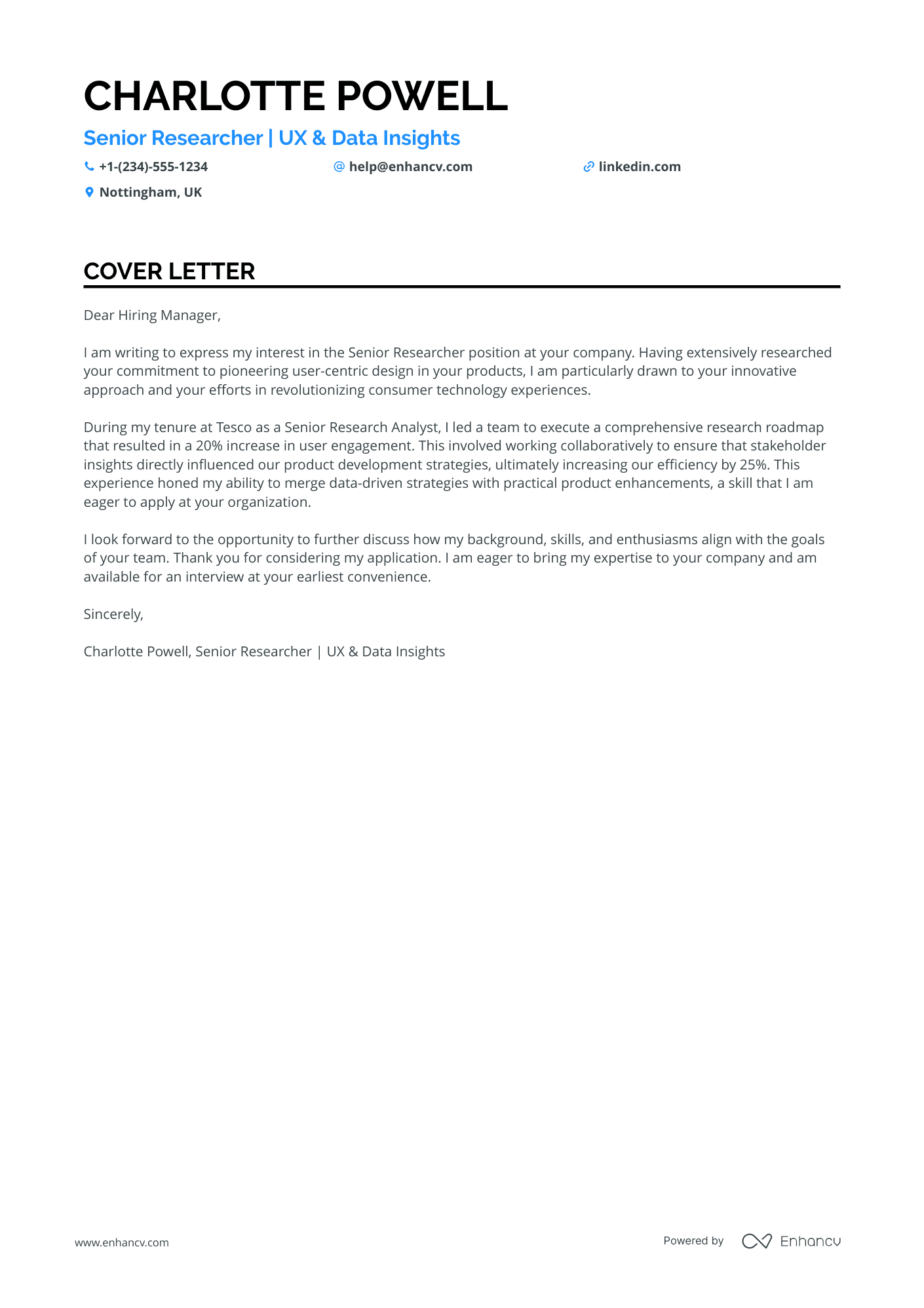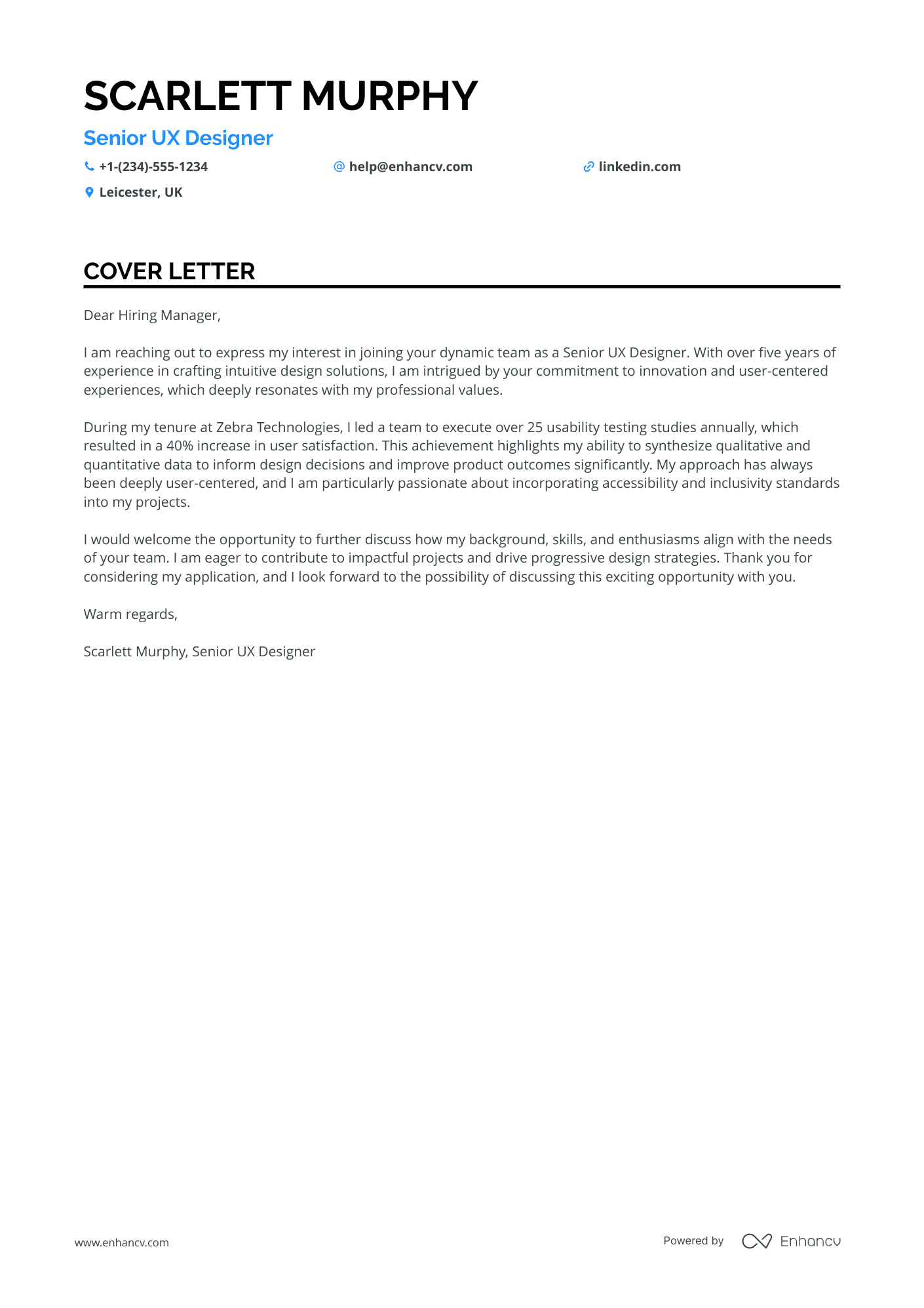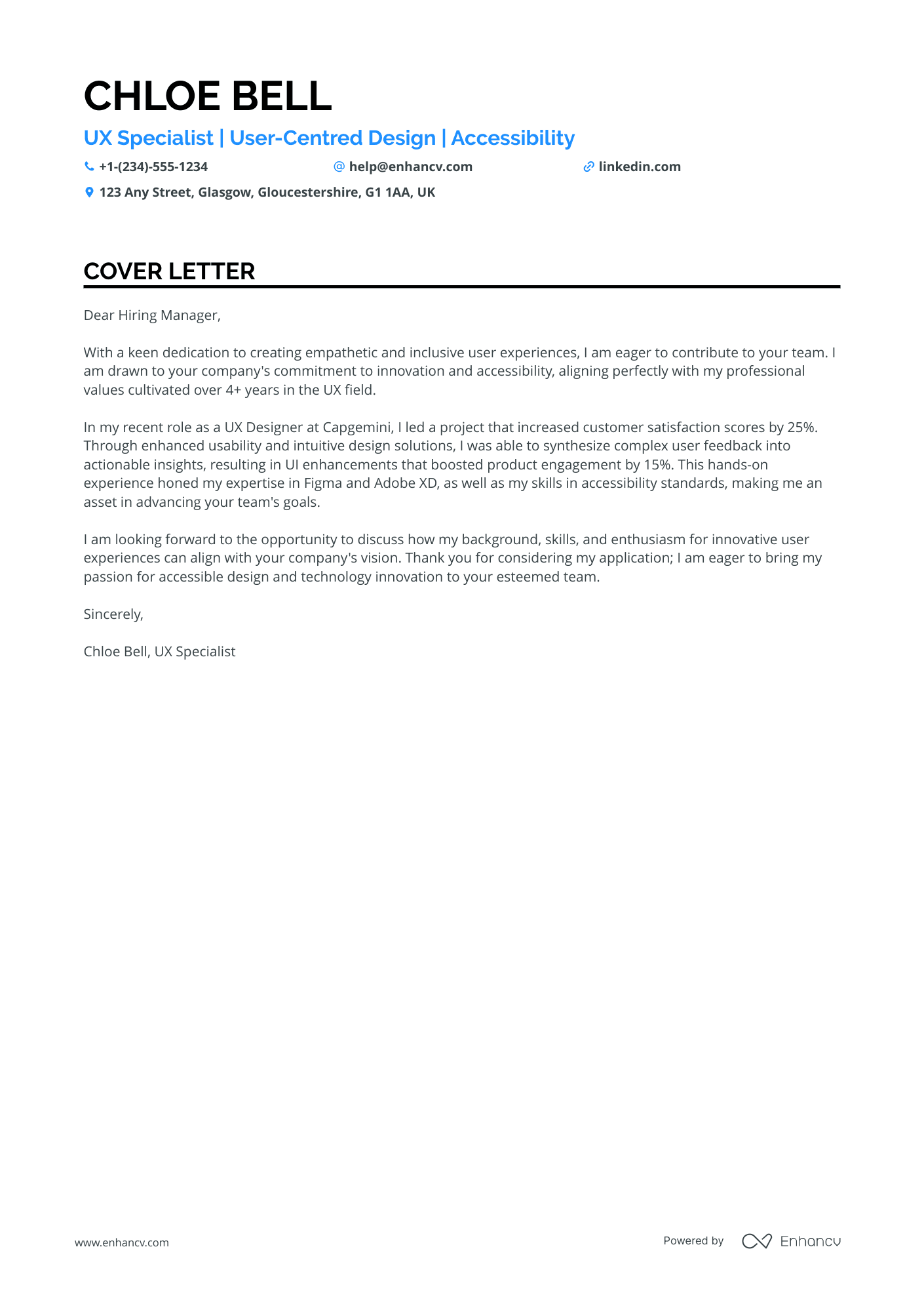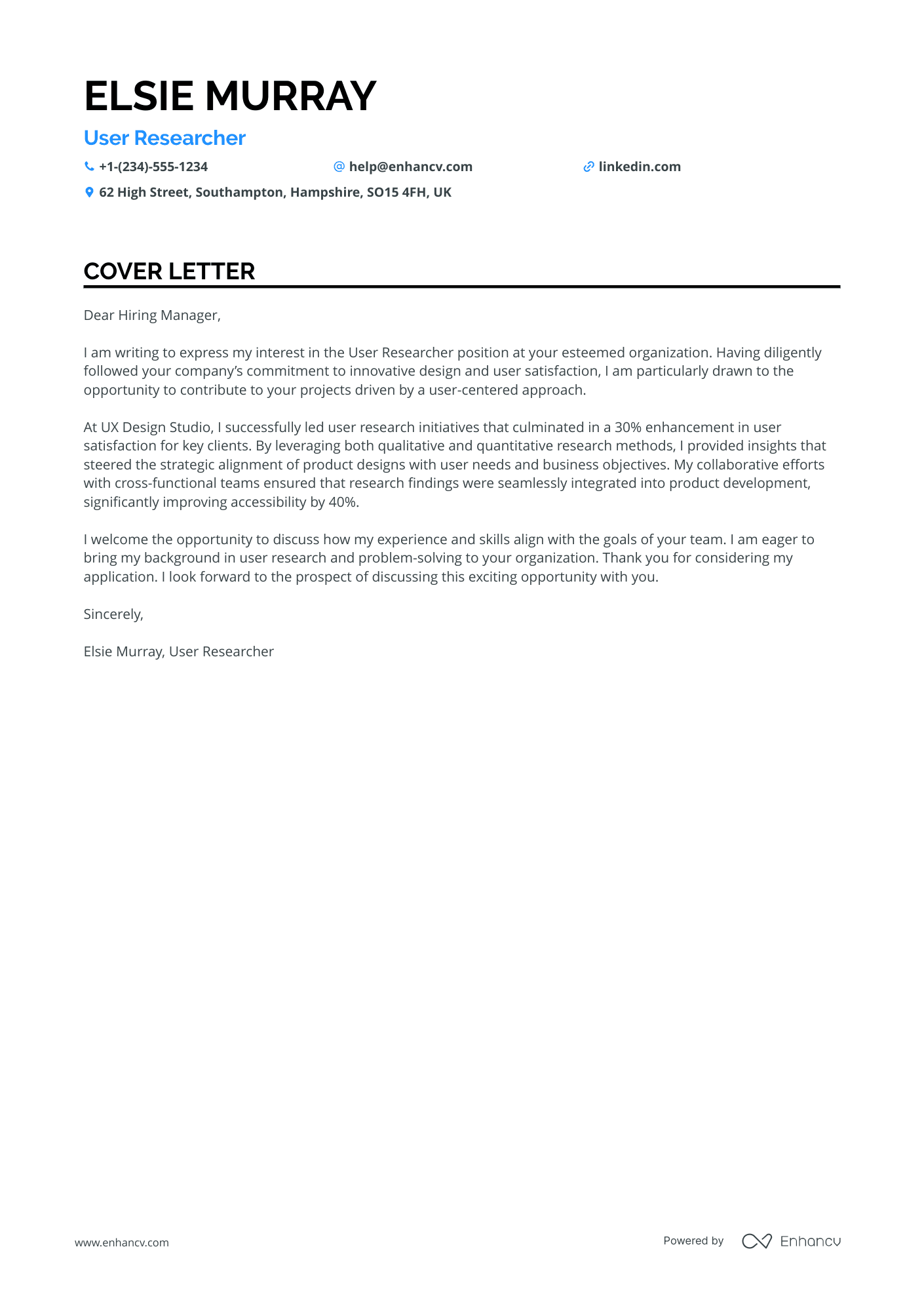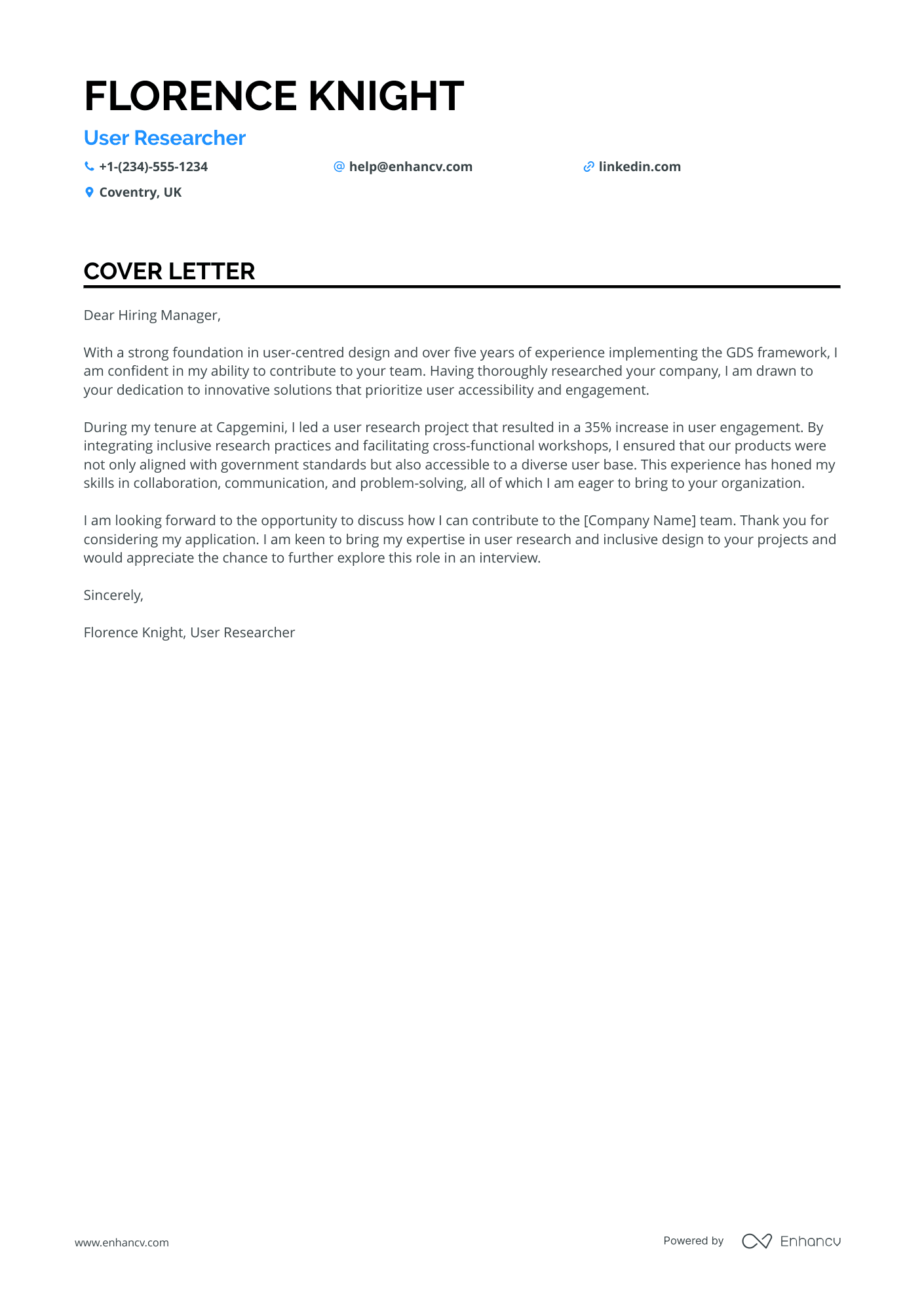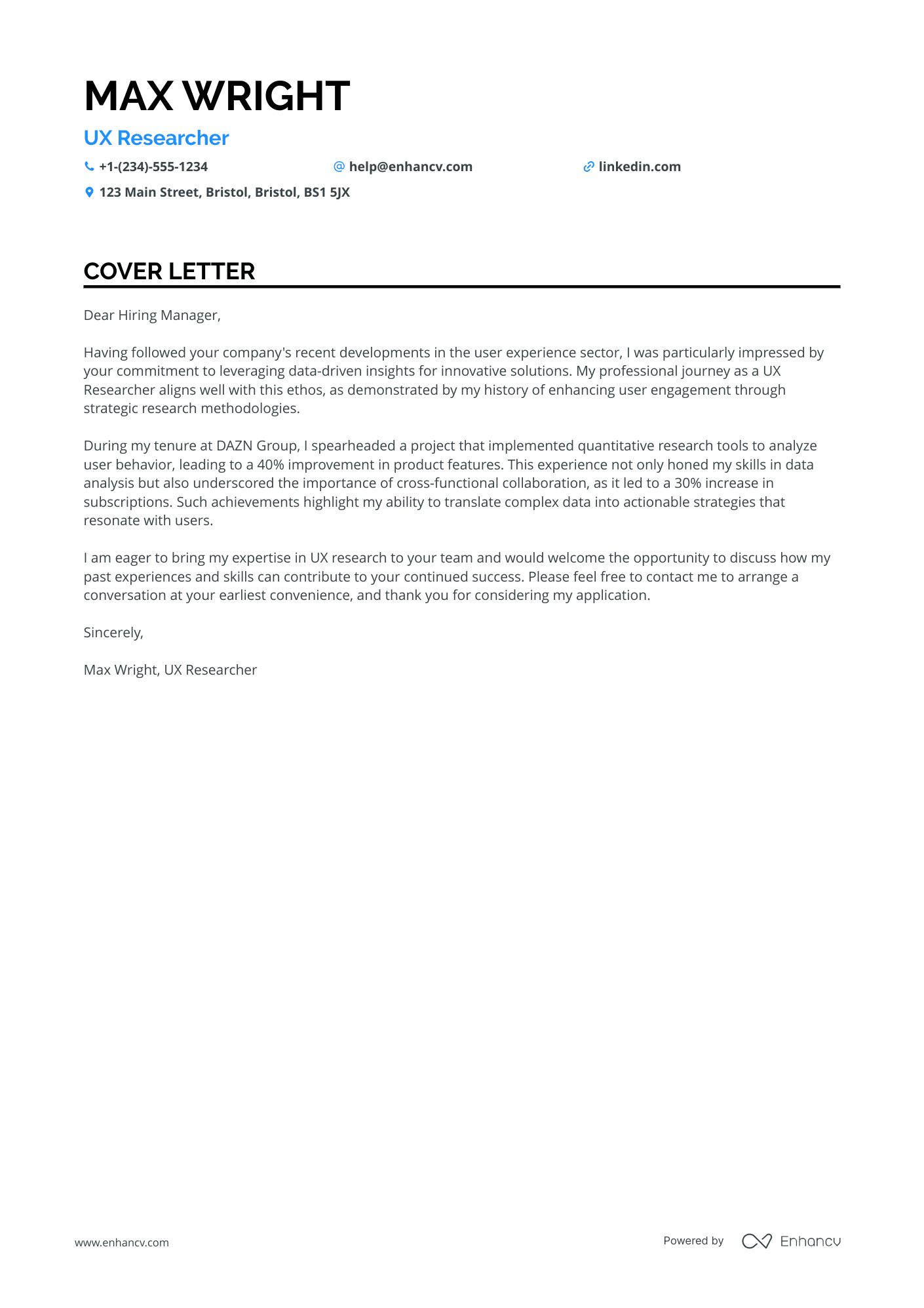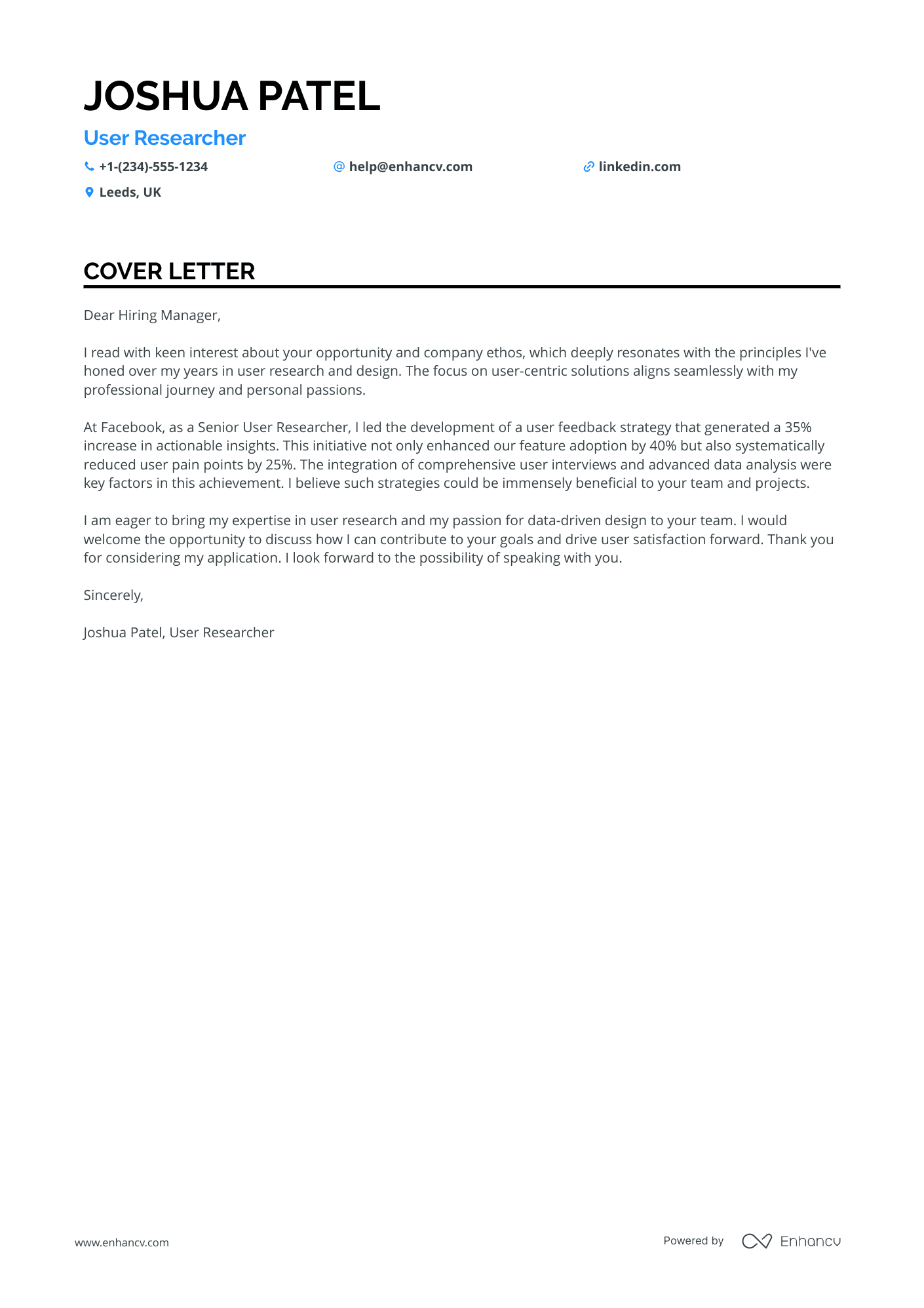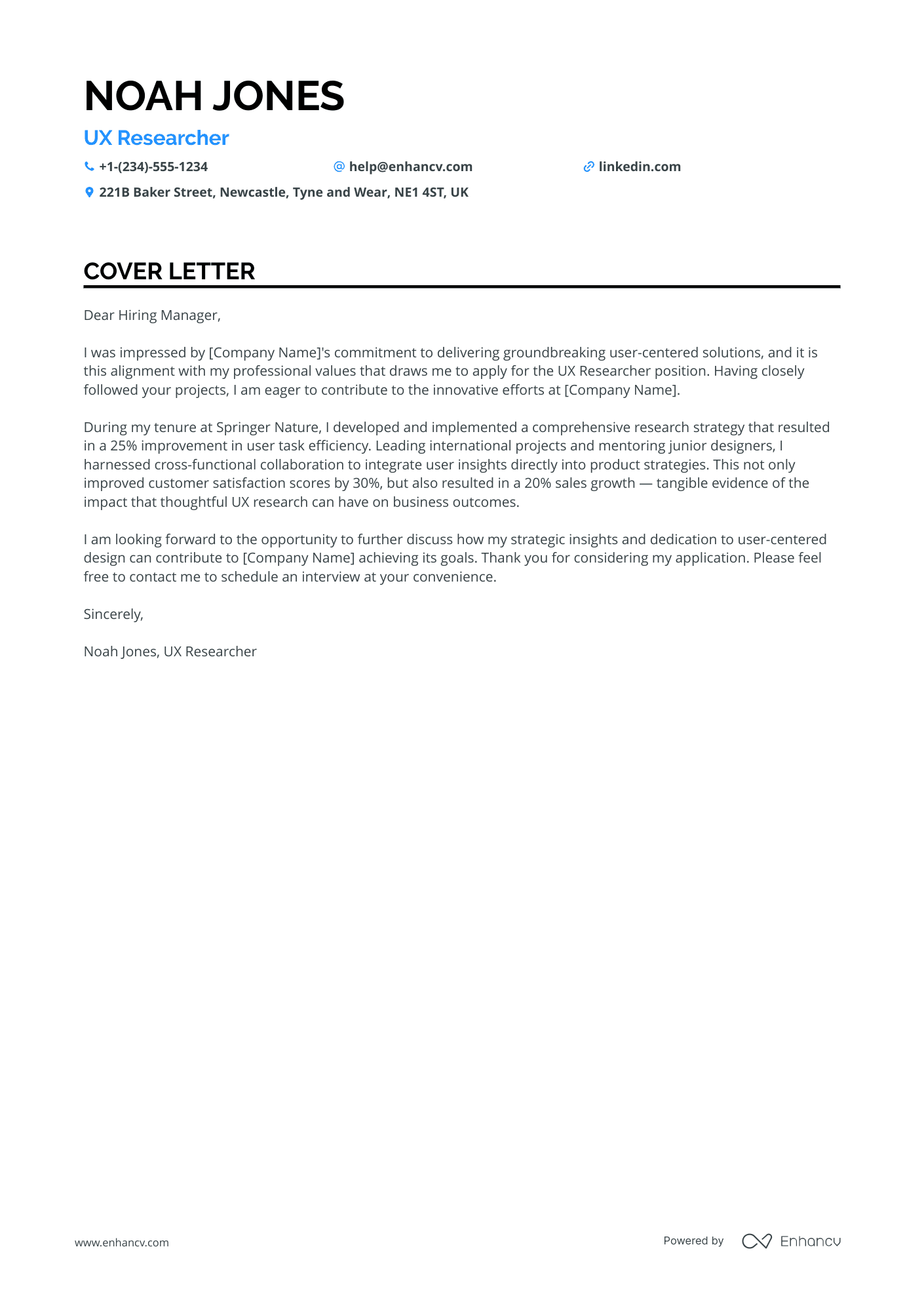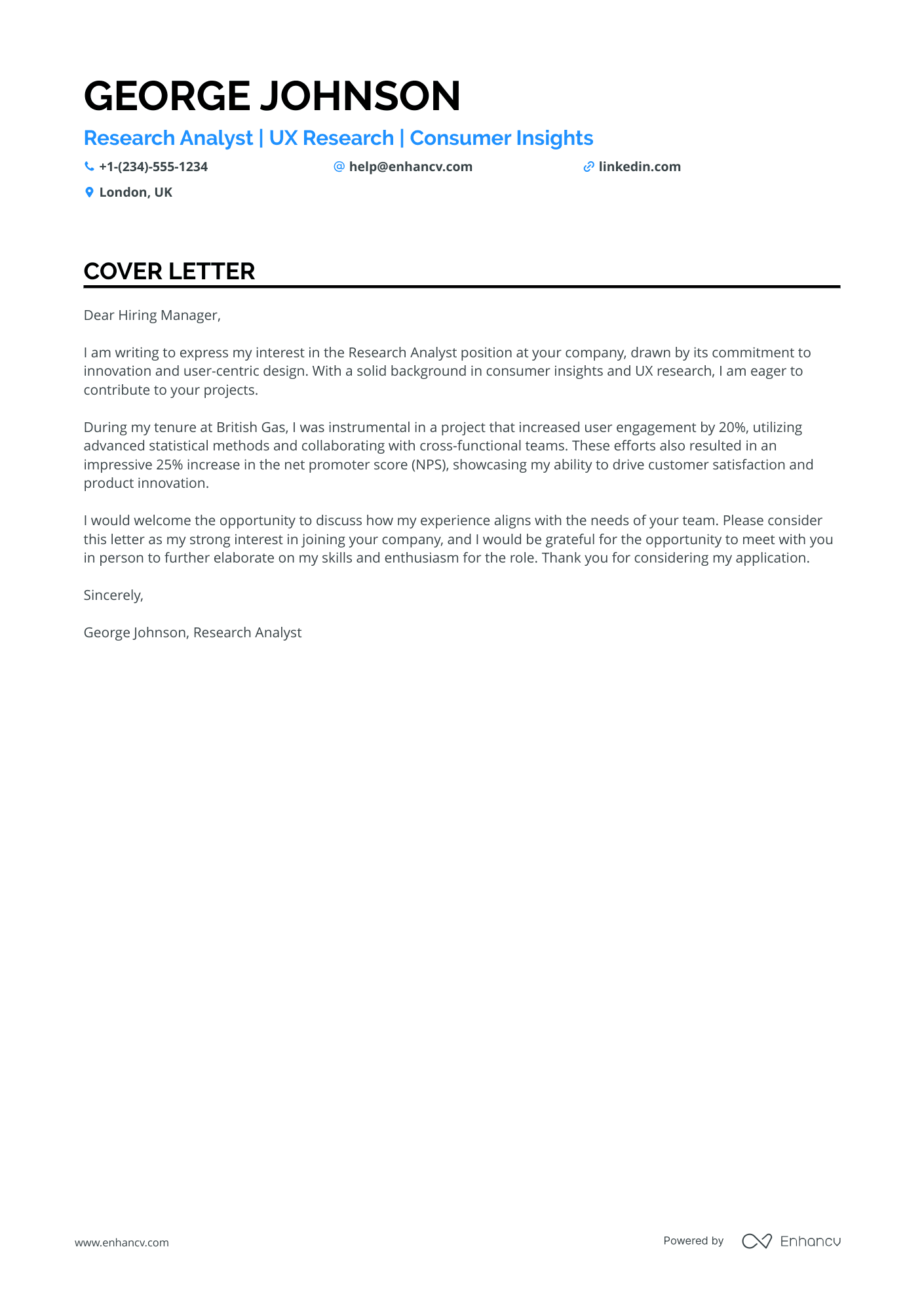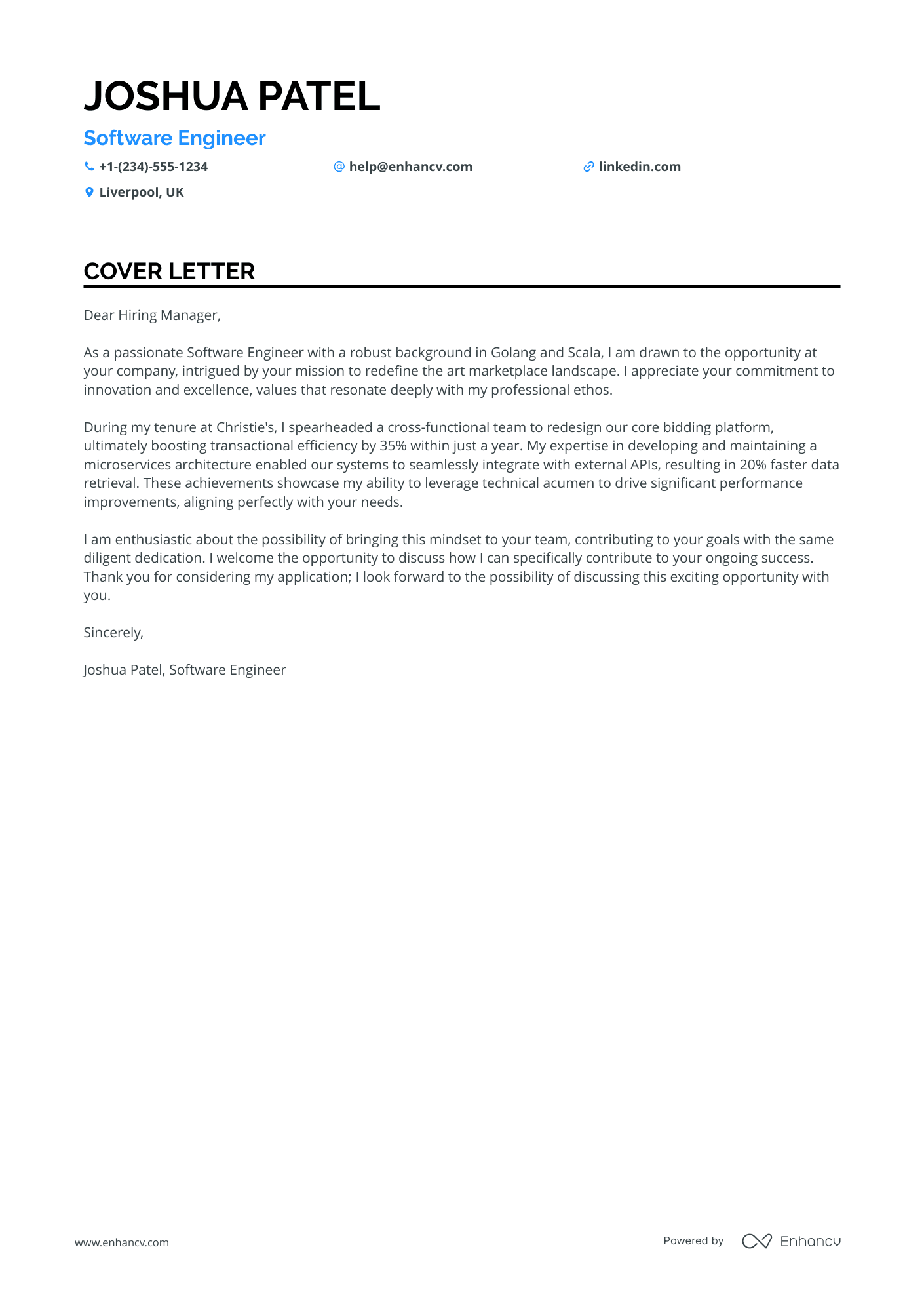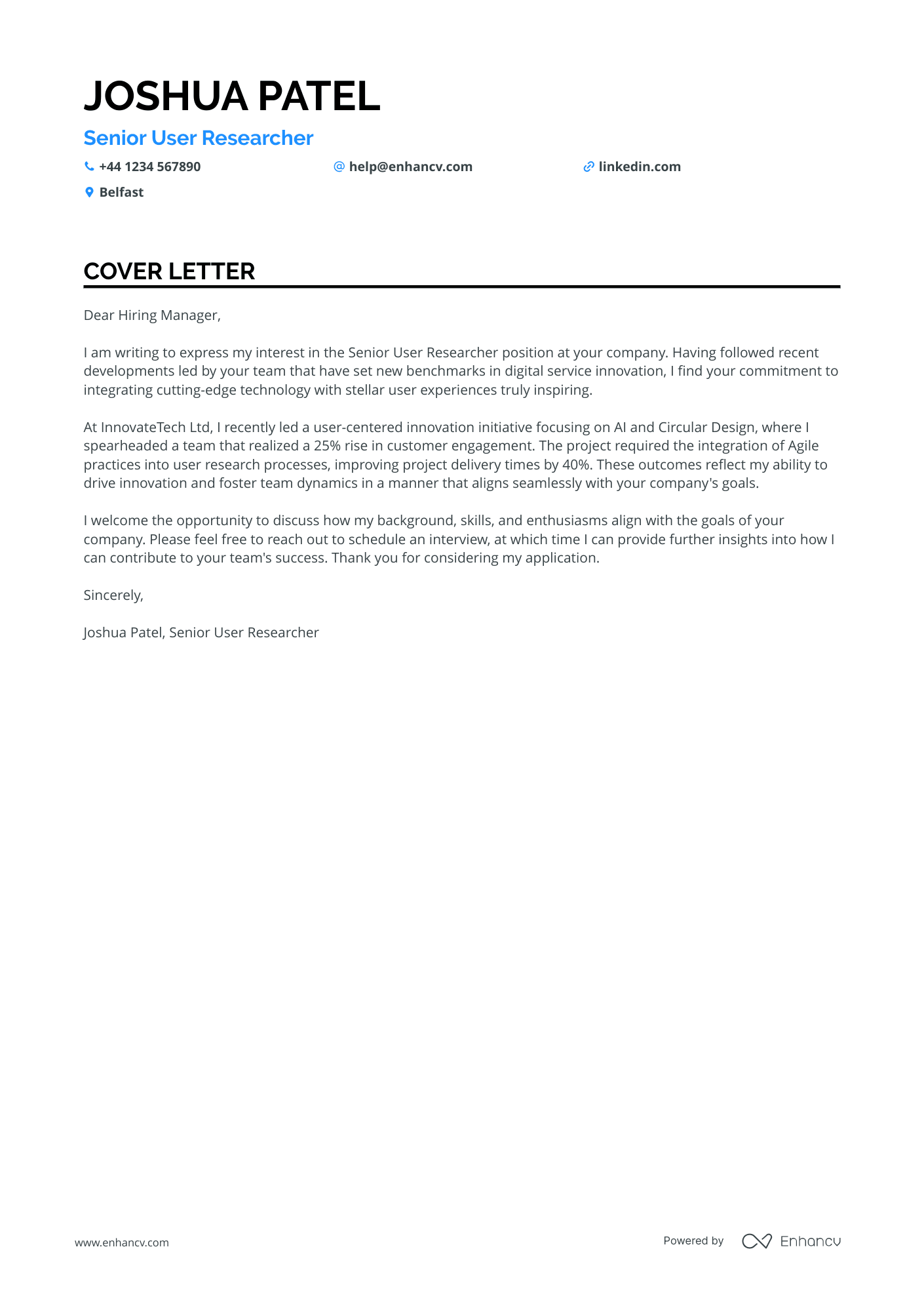When you start applying for jobs, you quickly realise that including a cover letter with your CV is a excellent way to stand out. But what should your cover letter focus on?
Should it emphasise your key achievements or simply list your responsibilities? And how can you effectively demonstrate that you're the ideal fit for the role?
One of the most common mistakes candidates make is either underselling themselves or overstating their experience.
In this guide, you’ll learn how to craft a compelling cover letter by showcasing your most significant professional achievement and telling the story behind it.
Cover letter examples for user researcher
By Experience
Junior User Researcher
- Quantifiable Achievements: The cover letter effectively highlights specific achievements, such as a 15% improvement in patient satisfaction scores and a 25% increase in user engagement, which emphasise the applicant's impact in previous roles.
- Relevant Experience: By aligning past experience from roles at NHS Digital and GE Healthcare with the desired position, the applicant demonstrates their suitability and depth of knowledge within the healthcare financial technology sector.
- Professional Development: The inclusion of courses like "Advanced User Research Methods" showcases proactivity in skill enhancement, reflecting a commitment to staying current with industry advancements.
- Passion and Personality: The mention of passions, such as improving healthcare experience and storytelling through research, adds a personal touch and helps to illustrate the candidate's enthusiasm for making a meaningful impact.
Senior User Researcher
- Highlighting Expertise: Emphasise over 10 years of experience in UX research to showcase depth of knowledge and expertise in the field, essential for a senior position.
- Quantifiable Achievements: Use quantified results, such as a 25% increase in reader engagement, to substantiate claims of past successes and demonstrate impact.
- Relevant Certifications: Mention certifications like "Advanced UX Research Methods" to highlight specialised skills and commitment to continuous learning.
- Leadership and Mentorship: Showcase leadership capabilities by mentioning initiatives like mentorship programmes and team improvement efforts, illustrating readiness for a senior role.
Lead User Researcher
- Highlighting User-Centred Design Expertise: Emphasising experience in user-centred design is crucial for a Lead User Researcher role, as demonstrated by strategies that boosted user satisfaction by 40%.
- Showcasing Leadership and Team Development Skills: Mentioning leadership experience, such as leading a team of 5 and achieving improvements in user engagement, can demonstrate ability to manage and develop a research team effectively.
- Emphasising Impact on Organisational Goals: Aligning research activities with organisational objectives, leading to a 50% increase in customer-centric deliveries, highlights strategic insight and value alignment.
- Certifications in Advanced Research Techniques: Citing specific certifications, like those from Nielsen Norman Group and Interaction Design Foundation, underscores commitment to staying updated with innovative research practices relevant to the role.
Principal User Researcher
- Highlight Relevant Experience: Emphasise the 7+ years of experience in security engineering, specifically mentioning roles that detail successful projects in vulnerability scanning and exploit protection.
- Specific Achievements: Clearly articulate quantifiable achievements such as reducing critical incidents by 40% through innovative tools, demonstrating the impact and effectiveness of your work.
- Technical Competence: Showcase specialised skills and tools such as reverse engineering and proficiency in languages like C, C++, and Python, highlighting the advanced technical abilities required for the role.
- Professional Development: Include advanced courses and qualifications relevant to the role, such as the Advanced Exploit Development from SANS Institute and a Master’s degree in Cyber Security, to underline ongoing commitment to professional growth.
By Role
User Researcher in Healthcare
- Relevant Experience: The cover letter effectively details Florence Knight's extensive experience in user research roles, particularly her achievements in enhancing user satisfaction and streamlining processes, which are critical tasks for an Associate User Researcher position.
- Skill Emphasis: Important skills, such as proficiency in Dovetail, Jira, and agile methodologies, are highlighted, showcasing Florence's capability to utilise these tools and practices to improve project outcomes and user experiences.
- Education and Certification: The letter outlines Florence's relevant educational background and certifications, such as her Master's degree in Human-Computer Interaction and courses in agile user experience research, supporting her expertise and continuous learning ambitions.
- Achievements and Metrics: By quantifying her impact, such as stating a 30% increase in user satisfaction and a 25% timeline reduction, the cover letter provides tangible proof of Florence's success and value in past roles, making a compelling case for her candidacy.
User Researcher in Digital Marketing
- Highlighting Quantifiable Achievements: The cover letter effectively uses specific data points, such as a 30% increase in user engagement and a 15% rise in usage rates, to demonstrate the impact of their work, making the candidate's achievements tangible and impressive.
- Showcasing Relevant Experience: Emphasising experience at major tech companies like Meta and Google, which are well-known for their innovative work in user research, strengthens the candidate's credibility and illustrates their capability to work in high-stakes environments.
- Emphasis on Strategic Skills: Mentioning skills such as "Design Thinking" and "Strategic Narratives" underscores the applicant's ability to not only conduct research but also to think strategically about how findings influence product development and user experience.
- Focusing on Education and Certifications: Highlighting formal education in relevant fields and certifications from respected institutions like the Nielsen Norman Group demonstrates depth of knowledge and commitment to staying current in the field of UX research.
User Interface Researcher
- Emphasising Relevant Experience: The cover letter effectively highlights Alexander's substantial experience in UX/UI design, showcasing specific achievements and responsibilities at organisations like DeepMind and ARM Ltd.
- Highlighting Skills in AI Integration: Alexander's role as an AI-powered tech enthusiast is well-supported by tangible accomplishments, such as leading the redesign of AI-driven interfaces and conducting user research initiatives.
- Showcasing Technical Proficiency: The mention of skills in React and Angular, alongside user research and usability testing, demonstrates Alexander's technical abilities crucial for UX/UI Design roles.
- Notable Achievements and Contributions: The cover letter effectively quantifies outcomes, such as increasing conversion rates by 25% and improving app engagement by 35%, adding credibility to Alexander's impact in previous positions.
User Researcher in Financial Services
- Experience Highlight: Clearly articulates over seven years of experience in user research, showcasing an increase in user engagement by 20%, which directly aligns with the goals of a Lead UX Researcher.
- Leadership and Management: Successfully led research teams and facilitated cross-departmental workshops, highlighting leadership skills and the ability to drive interdisciplinary collaboration.
- Educational Background: Holds a Master of Science in Human-Computer Interaction from University College London, a prestigious qualification that underlines the applicant's expertise in UX research.
- Relevant Industry Passion: Demonstrates a strong enthusiasm for cryptocurrency and blockchain technology, suggesting a keen interest in innovative financial solutions, which could offer unique insights into user interactions and experiences in this sector.
User Researcher in Education Technology
- Emphasise quantifiable achievements: The cover letter highlights improvements such as boosting user satisfaction by 30% and increasing conversion rates by 20%, which effectively demonstrates the direct impact of the applicant's work and drives home the value they bring to a role.
- Highlight relevant experience: Mentioning key positions held at reputable companies like Deloitte Digital and Amazon adds credibility and demonstrates the applicant's capacity to thrive in challenging environments, which is particularly valuable for a UX Researcher role.
- Detail specific skills and methodologies: Listing advanced skills such as usability testing and qualitative/quantitative research methods, as well as specific tools like Figma and Qualtrics, showcases a comprehensive understanding of the technical requirements necessary for the role.
- Include relevant education and courses: The cover letter mentions degrees in Human-Computer Interaction and Psychology, illustrating a solid foundation in understanding human behaviour, which is crucial for excelling in UX Research. Additionally, specialised courses further underline the applicant’s commitment to mastering their field.
User Researcher in Retail
- Relevance of Experience: The cover letter effectively highlights the applicant's experience with prominent UK retailers such as Tesco, Sainsbury's, and Ocado, which demonstrates direct industry relevance and familiarity with the specific market of grocery shopping and retail.
- Quantifiable Achievements: It includes specific metrics like a 30% increase in customer retention and a 20% increase in user engagement, showcasing the candidate's ability to deliver measurable improvements, which are essential in data-driven roles.
- Educational Background: The mention of a Master of Science in Human-Computer Interaction aligns well with the position focused on UX and data insights, reinforcing the candidate’s academic qualifications relevant to the role.
- Specialised Skills: It highlights specialised skills such as qualitative and quantitative research, usability testing, and stakeholder engagement, which are key competencies for a UX and data insights researcher.
User Researcher in Gaming
- Scarlett's cover letter effectively highlights her experience and accomplishments as a UX designer, providing specific metrics that demonstrate her impact, such as increasing user satisfaction by 40% and reducing process bottlenecks by 25%.
- The inclusion of relevant certifications, like the "Certified Professional in Accessibility Core Competencies," helps underscore her commitment to maintaining high standards in accessibility, which is crucial for UX roles.
- Emphasising her leadership skills as a Senior UX Designer, particularly through mentoring, collaboration with cross-functional teams, and advocating for user-centred design, strengthens her suitability for senior positions that require such capabilities.
- Mentioning her passion for "Empowering Veterans through Design" not only personalises the cover letter but also aligns her individual interests with potential projects at organisations that might share this mission.
User Researcher in Travel and Tourism
- Relevant Experience: The cover letter highlights Chloe's extensive experience with leading UX projects at renowned companies like Capgemini and IBM, showcasing her ability to enhance user engagement and accessibility compliance. For a UX Specialist role, these achievements emphasise her capability to contribute effectively.
- Certifications and Education: Chloe's education in Human-Computer Interaction and professional certification in accessibility core competencies are strategically included, underscoring her specialized knowledge and dedication to maintaining industry standards.
- Technological Proficiency: References to skills in using tools like Figma, Adobe XD, and understanding of Agile methodologies show her adeptness in employing modern design tools and frameworks, crucial for a UX-oriented role.
- Advocacy for Accessibility: Her passion for accessible design and ability to increase satisfaction among assistive tech users highlights Chloe's commitment to inclusivity, an increasingly valued focus in UX design today.
User Researcher in Public Sector
- Emphasising relevant experience and past achievements, such as a 30% improvement in user satisfaction and increased team output by 25%, effectively showcases impact and expertise in user research and management roles.
- Citing specialised certifications, like the Certified Professional in Accessibility Core Competencies (CPACC), highlights her commitment to accessibility, a crucial aspect of user-centred design.
- Incorporating skills in qualitative and quantitative research techniques as well as stakeholder management underlines her proficiency in facilitating research-driven decision-making and collaboration.
- Demonstrating passion for inclusive technology and psychological research through personal interests reinforces her dedication to creating user-friendly digital environments, further aligning with the role's objectives.
User Researcher in Non-profit
- Highlighting extensive experience in user-centred digital services and expertise in the GDS framework effectively positions Florence as highly qualified for roles involving public sector projects in the UK.
- Emphasising achievements, such as a 30% increase in user satisfaction and a 35% rise in user engagement, provides tangible proof of Florence's capability to enhance product accessibility and overall user experience.
- Mentioning specific advanced certifications, such as the Nielsen Norman Group's Advanced Usability Testing Methods and Government Digital Service Professional Training, reinforces Florence's commitment to continuing professional development and staying updated with industry best practices.
- Focusing on leadership in diversity initiatives showcases Florence's advocacy for inclusive research practices, aligning well with modern expectations for accessibility and inclusivity in product design.
User Researcher in E-commerce
- Quantifiable Success: The cover letter effectively highlights measurable outcomes, such as a 25% increase in user engagement and a 30% increase in subscriptions, showcasing the candidate's ability to deliver impactful results.
- Specialised Skills: Specific mention of skills like quantitative analysis and remote usability testing aligns with the requirements of a UX Researcher, emphasising the candidate's expertise in essential areas for the role.
- Professional Certifications: Highlighting courses from reputed institutions like Nielsen Norman Group adds credibility and demonstrates continuous learning and dedication to the field.
- Cross-functional Collaboration: Emphasising cross-functional collaboration experience underscores the candidate's capability to work effectively in diverse team settings, a valuable trait for UX roles.
User Researcher in Telecommunications
- Summary Statement: The cover letter begins with a succinct summary that highlights the candidate's years of experience, specific expertise, and the value they can bring to the role, which immediately establishes relevance and captures attention.
- Relevant Experience: The candidate provides detailed, quantifiable achievements throughout their experience section, such as enhancing feature adoption by 40% and boosting user satisfaction by 20%, effectively demonstrating their capability and impact in prior roles.
- Education and Courses: Mention of specialised courses like "Advanced User Research Techniques" and a Master’s degree in Human-Computer Interaction strengthens their credibility and shows a commitment to staying updated in their field.
- Specific Skills: Skills such as "Remote Collaboration" and "Cross-functional Teamwork" are particularly emphasised, aligning well with the growing need for remote teamwork capabilities in today's job market.
User Researcher in Automotive
- Relevant Experience: The cover letter effectively highlights Noah's 6 years of experience in UX research, emphasising his ability to deliver strategic user insights, a crucial aspect for a UX Researcher role.
- Achievements with Quantified Impact: Quantifying achievements such as a 30% increase in product satisfaction underscores the applicant's contributions and ability to make a tangible difference, which is valuable in demonstrating effectiveness in the role.
- Cross-Functional Collaboration Skills: Mentioning collaboration with cross-functional teams to integrate research findings shows the applicant's ability to work effectively within diverse project teams, an essential skill for ensuring user insights are translated into actionable product enhancements.
- Educational Background: Highlighting a Master's in Human-Computer Interaction and a Bachelor’s in Psychology demonstrates a strong educational foundation relevant to understanding user behaviour and interaction, which reinforces Noah’s expertise in the field.
User Researcher in Energy
- Highlight relevant certifications and courses: The mention of completing courses on Advanced Survey Design and Consumer Behaviour Analysis aligns with the role of a Research Analyst, showcasing the candidate’s dedication to enhancing their skills and knowledge in specialised areas.
- Emphasise measurable achievements: The cover letter details specific outcomes such as a 20% increase in user engagement and a 12% product uptake. These quantified results demonstrate the candidate’s effectiveness and impact in their previous roles.
- Showcase cross-functional collaboration skills: The candidate illustrates their ability to work with various teams, such as UX designers and product managers, which is crucial for the role. This capability is further supported by examples of coordinating cross-functional workshops and leading strategic changes.
- Align personal passions with professional objectives: Mentioning a passion for sustainable living and technology advancements connects personal interests with the role’s requirements, presenting a well-rounded individual whose personal values complement the professional environment.
User Researcher in Real Estate
- Highlighting Technical Expertise: Mentioning proficiency in Golang, Scala, and distributed systems, aligning with the technical requirements of a Software Engineer position.
- Personal Achievements: Including quantifiable successes such as improving cloud infrastructure efficiency and optimizing existing systems, which demonstrate concrete impact and value addition.
- Leadership and Mentoring: Describing experience in leading cross-functional teams and mentoring junior developers to showcase leadership skills and ability to nurture talent within an organisation.
- Continuous Learning: Highlighting ongoing education and specific technical courses undertaken to show a commitment to staying current with industry advancements and enhancing technical knowledge.
User Researcher cover letter example
Joshua Patel
Belfast
+44 1234 567890
help@enhancv.com
- Highlight Relevant Experience: Mention specific projects or initiatives that align with the employer's objectives, such as leading a user-centered innovation initiative, to demonstrate your qualifications and effectiveness in a similar capacity.
- Showcase Achievements with Metrics: Quantify your accomplishments like a “25% rise in customer engagement” and “40% improvement in project delivery times” to provide tangible evidence of your impact and ability to deliver results.
- Align Personal Passion with Company Goals: Express genuine interest and enthusiasm for the company's recent developments and goals to show cultural fit, understanding of the company’s mission, and motivation to contribute to its success.
- Offer Opportunities for Further Engagement: Invite the employer to schedule an interview to discuss how you can meet their needs, demonstrating optimism and confidence in your potential to add value to their team.
Importance of cover letters in the United Kingdom
Cover letters are a crucial tool in making your application personal and engaging.
Here are three reasons why they matter:
- Personalisation: Unlike a CV, a cover letter allows you to show your enthusiasm for the role, giving a more personal insight.
- Addresses details about your career: Whether you’re changing careers or have gaps in employment, your cover letter offers a space to explain these in a constructive way.
- Meeting the job requirements: Your cover letter should be unique and tailored, clearly showing how your skills align with the role requirements.
What UK employers expect from a cover letter
When writing your cover letter for a UK employer, it’s important to keep several things in mind. First, you need to conduct a thorough research, which includes reading up on the company’s website, recent news, and their presence on social media. Understanding the company’s latest achievements and its overall mission will allow you to tailor your letter to their specific needs.
Next, focus on the company’s core values. Whether they value teamwork, innovation, or community involvement, highlighting how your own experience aligns with these principles is essential.
Finally, don’t forget to match your skills to the job’s requirements. Study the job description carefully and pick out the most important qualifications or competencies. Then, provide evidence of how you meet those criteria with concrete examples from your past work experience.
How to format a user researcher cover letter
To get your cover letter's formatting right:
- Use a modern font like Lato, Raleway, or Chivo, rather than the overused Arial or Times New Roman.
- Set your cover letter to be single-spaced with 1-inch (2.5 cm) margins on all sides—our templates are automatically set up for you.
- Ensure both your CV and cover letter are consistent in font style and formatting.
- Always send your cover letter as a PDF to prevent alterations and preserve its layout.
When it comes to structuring your cover letter, follow this sequence: begin with your address and contact details, then the employer's details (i.e. name and address), and the date. Next, start with a personalised greeting, followed by your introductory, body, and closing paragraphs. Be sure to include a sign-off and your signature at the end.
Remember, although Applicant Tracking Systems (ATS) software, which may scan your CV for keywords, won't read your cover letter, it will be reviewed by recruiters.
How to write your user researcher cover letter salutation
First impressions often start with the greeting and in the case of your job application, 'Dear Sir or Madam' simply won't suffice.
Find out who’s hiring for the role—by calling or emailing the company, searching online, or using LinkedIn—and address them correctly.
Generally, you should address them by their surname (e.g., 'Dear Mrs Weasley'), but if you've spoken to them before, you might use their first name (e.g., 'Dear Albus').
How to write your user researcher cover letter intro
One of the best ways to grab a hiring manager's attention? Show them the unique value you'd add to the team.
Review the skills or requirements listed in the posting and draw connections to your previous work experiences.
Focus on specific (and quantifiable) accomplishments and qualifications that align with the job description to make a strong first impression.
How to write your user researcher cover letter body
You’ve personalised your greeting and introduction—now it’s time to focus on writing the body of your cover letter.
Instead of listing off skills and responsibilities from your CV, focus on one career highlight that’s relevant to the role.
Use your hard and soft skills, success metrics (e.g., percentages or sales figures), and the long-term impact it had on the company.
A concise, well-told story centred on your value as a candidate will make a strong impression.
How to write a closing paragraph
When ending your cover letter, you have two options:
Option one is to promise how you’d contribute to the organisation—whether that’s improving a target or achieving a specific goal—or how the company could help you grow professionally. Always emphasise the tangible impact you can deliver.
The second option is to close by asking when you can expect to hear back from the hiring managers, whether for an update or to arrange an interview.
Conclusion
A standout cover letter is crucial for making an strong impression in your job search in the UK market. Personalise your letter by addressing it to the hiring manager and aligning your skills with the job description.
Use concrete examples to highlight your greatest achievement and convey your enthusiasm for the position. Finally, ensure that both your cover letter and CV are presented professionally for a consistent application.
